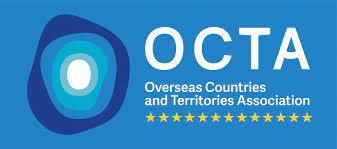The OCT Association (OCTA)
The association has 13 members:
- 6 Dutch OCTs
- 6 French OCTs
- 1 Danish OCT
In June 2021, the 9 British territories left the association, given the effects of Brexit. An MoU was signed with the UKOTA association to establish new bases for cooperation with these territories.
- to provide a forum for the exchange of ideas and discussion of problems of common interest;
- to work for the mutual benefit of members;
- share specific information on issues of interest for and benefiting all OCTs;
- make recommendations, where appropriate, to the governments of all OCTs and EU Member States on suitable measures to be taken;
- develop effective working relations, as a group, with the institutions of the European Union, the ACP (Africa, Caribbean, Pacific) Group and its Secretariat and other international, multilateral and regional organizations and institutions ;
- to share best practices with its members in corresponding fields;
- to defend the collective interests of the members and to represent these interests vis-à-vis the institutions of the European Union, with regard to all the subjects put forward in the Overseas Association Decision.
OCTA has its own budget, based on annual contributions from the OCTs. It also benefits from an EU grant, financed until 2021 under the 11th EDF. This grant covers 80% of the Association's operating costs and the activities implemented according to the annual roadmap and budget agreed with the Commission. The 20% of co-financing is provided by the members of OCTA through annual dues and financial reserves of the association. For 2020-2021, OCTA has received EU support of approximately €1.1 million (or about €550,000 per year).
The Ministerial Conference is the supreme body of the association and brings together all OCT representatives (Heads of Government or designated members of OCT governments accompanied by their delegations) ahead of the annual EU-OCT Forum.
As President of the Government of New Caledonia, Mr. Mapou currently holds the Chairmanship of the OCTA. In this capacity, New Caledonia is expected to host the next ministerial and the EU-OCT Forum in the first half of 2022. Greenland is the vice-president.
The OCTA Executive Committee (ExCo) acts as the Secretariat of the Ministerial Conference. It has 7 members (OCT representatives based in Paris, The Hague, London or Brussels). The chairmanship is held by the representative of Aruba and the vice-chairmanship by Wallis and Futuna. New Caledonia is a member of the Executive Committee of the association and acts as secretary. The other members are: French Polynesia, Sint Maarten, Curaçao and Greenland.
The Executive Committee is supported by a secretariat located in Brussels, in the center of the European institutions. It includes a coordinator, an administrative and financial assistant, an "EU programs" officer, an "environment and energy" officer and an officer recruited as a part of of the "Archipelago EU" cultural project.
A new OCTA strategic plan for the period 2021-2027 was adopted on December 1 at an extraordinary Ministerial Conference. It is structured around three priorities: 1) policy and strategic dialogue, coupled with the priority of sound and inclusive governance of the association; 2) communication and learning, aiming to raise awareness and build the capacity of OCTs and European stakeholders to participate in and contribute to the EU-OCT partnership; and 3) cooperation in strategic areas, which will focus specifically on the functions, needs, and specificities of the OCTs, aligning in particular with the Green Pact and blue growth, regional cooperation and integration, and youth, education, and culture.
In addition to the unanimous adoption of the new strategy, the delegations decided to increase the annual membership fees in order to maintain a budget commensurate with the ambitions of the new strategy and to show the political commitment of the OCTs.
The summary of the strategy is available at:
https://www.overseas-association.eu/fr/les-membres-de-locta-adopent-la-n...

